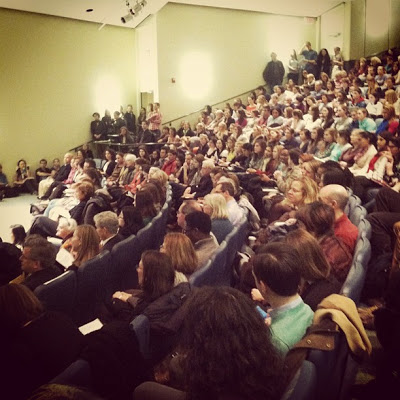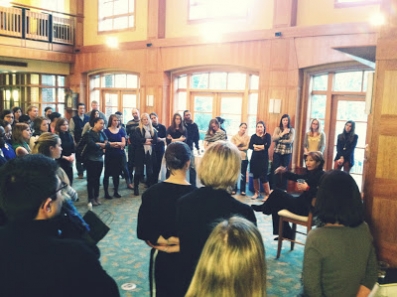Apr 22, 2013
Leading Voices in Higher Education: Anne-Marie Slaughter
By Marcy H. TP'14
A couple weeks ago Dr Anne-Marie Slaughter came to Dartmouth and gave a lecture titled "Why Women Still Can't Have It All: Getting to a Place of Equal Opportunity." The lecture was part of Dartmouth's Leading Voices in Higher Education speaker series, and organized in part through Tuck's Women in Business club.
I was able to attend the lecture... just barely. I may not personally aim to climb the ranks of academia or top executive positions, but as a feminist and someone who agreed with a lot of what Dr Slaughter wrote in her now-famous piece in The Atlantic I was very excited when I saw the email announcing this lecture. I arrived at 4pm, just as the lecture was set to start (aptly enough, after rushing around to pick up my 5yo from school, get my kids ready, and drop them off with a friend so I could rush down to campus to listen in), and found Cook Auditorium packed to the GILLS! I managed to squeeze in and find myself a spot on the floor in one of the aisles. This was clearly a very popular event, with everyone from Dartmouth undergrads to Tuck business students (and, ahem, their partners) to staff and faculty in attendance.
 |
|
A full house -- Cook Auditorium |
In her talk, Dr Slaughter first went over the types of reactions she got from her essay, both expected and unexpected. These ranged from gratitude and relief from many working mothers, thanking her for finally admitting/talking openly about these issues; to anger from women who saw this whole conversation as a step backwards; to young men and fathers admitting that they, too, want a different work/life balance than what their fathers had. Interestingly, she noted that the types of responses seemed to align more with generation/age than gender.
From there, she went on to describe a few ideas of how to move forward. You can watch her entire lecture online here, but below are a few of her main points (as they stood out to me):
-
We now have the formal choice of equality for men and women, but we lack the social structure to support those choices.
-
We need to stop framing the work/life/family balance issue as a "women's issue" or talk as if it only applies to working mothers. We need to talk about working fathers as well.
-
Our workplaces are designed with the assumption that each employee is the Breadwinner, with a full-time partner at home to manage the home/family sphere. This needs to change-- it is not the reality for most people (and indeed only ever was for a certain population, for a short period of history). Most people today will both work and also need to help care for family members (be they children, parents, extended family, etc). We need to build in better flexibility for everyone to have the freedom to pursue careers and also slow down every once in a while as life dictates. This includes paid parental leave, flex time, and affordable daycare-- and we need both mothers and fathers demanding these policies.
-
We need to break the assumption of the male as "breadwinner" and female as "caregiver." When a couple has a baby it is usually assumed that the woman will bear the brunt of adjusting to the demands on parenthood and will take a break in her career, while the man continues on as before. Dr Slaughter believes it is often necessary for one parent to be the "more available parent," who has a lighter work load or more flexible schedule and so is able to step in and take care of any family crises that come up. However, there is no reason to assume that should be the mother. She brought up the example of same-sex couples who don't have gender "defaults" to fall back on, therefore have to sit down and figure out what role each parent will play within the family. Couples should hash out who will be the Breadwinner and who will be the Caregiver (or how to split those roles), using personality, personal goals, career goals, etc as deciding factors rather than gender.
-
Most men still feel immense pressure to be the provider, to support his family financially. We tell little girls that they can grow up to be anything they want to be-- we should also be telling young boys that they can grow up to be Caregivers. If men feel comfortable taking on the role of caring for their families (vs pursuing high-paying careers for the sake of financial stability alone), that frees up their wives to pursue their own career goals. Women won't have better choices unless we also allow for better choices for men.
-
We need to respect and value caregiving, in general. Our culture values care so poorly, whether it be parents staying home with our children or jobs that involve caring for other people's children (or the elderly, or the ill, etc). Our poorest class is made up of single mothers. Our society depends on caregivers, yet we refuse to acknowledge that or their importance.
After the lecture, WIB had arranged for a small reception and Q&A session with Dr Slaughter just for Tuck students, partners, faculty, and staff (there were about 80 of us in the room). It was a great opportunity to have a more intimate discussion and ask personal questions. Several students brought up specific career/life challenges they are facing or anticipate, and for advice on handling them.
 |
|
Private reception with the Tuck community |
I feel very grateful for the chance to attend both the lecture and the reception that followed. This is such an important discussion to be having, and while I have reservations about some of Dr Slaughter's points (eg- much of the advice she puts forward assumes a two-parent household, and one in which the couple has the freedom, resources, and flexibility to allow one parent to "slow down" while the other pursues their career with full force) I do think she makes some excellent points about things that need to change in our culture for all of us to be able to move forward and have more and better choices.

